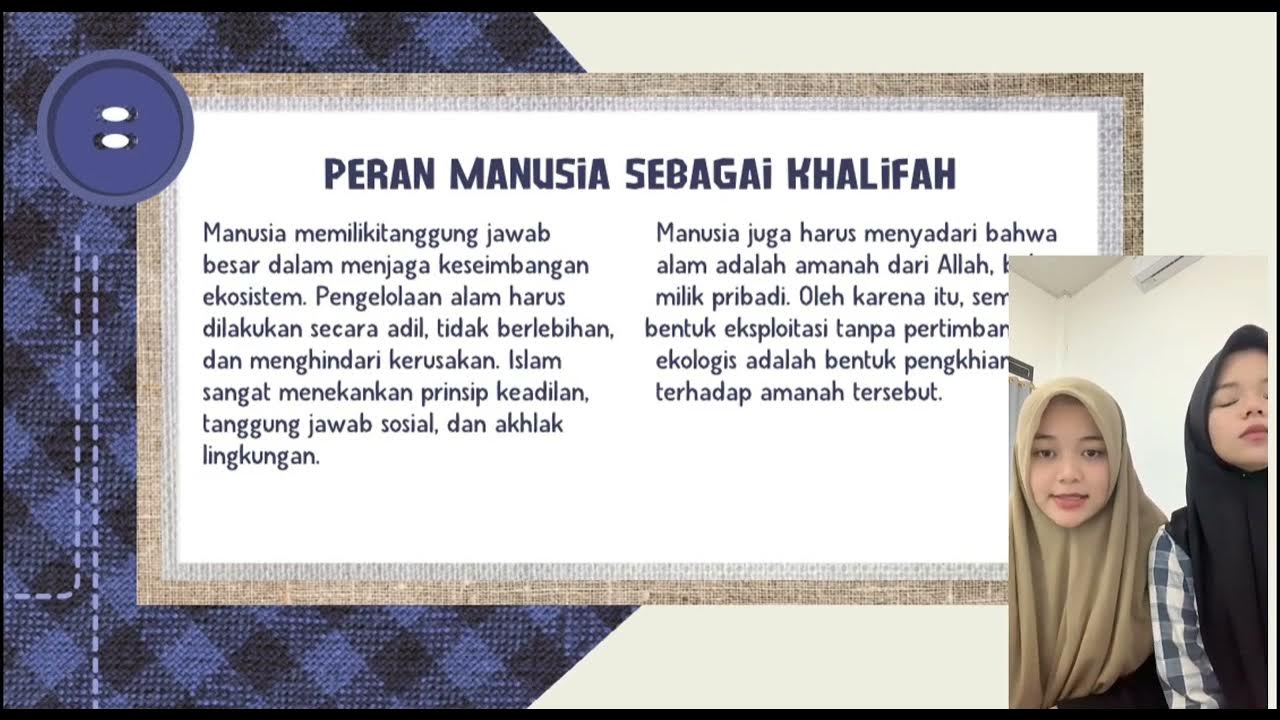Kedudukan Alam Semesta, Manusia, dan Ilmu Pengetahuan dalam Perspektif Filsafat Pendidikan Islam
Summary
TLDRThis presentation explores the interconnected roles of the universe, humans, and knowledge within the perspective of Islamic educational philosophy. It emphasizes the universe as a vast, lifelong learning space, where every element offers lessons to humanity. Humans are positioned as both servants of Allah and His vicegerents (khalifah), tasked with caretaking and managing the Earth. Knowledge is seen as a vital tool to understand Allah’s creation, develop intellectual capacities, and fulfill spiritual and worldly duties. Ultimately, the video highlights the importance of observing, learning, and applying knowledge to align with divine purpose and maintain balance in the world.
Takeaways
- 😀 The universe is viewed as a lifelong educational tool for humans, encouraging constant learning and discovery.
- 😀 Islam emphasizes the role of the universe as a library, where every aspect of nature offers valuable lessons and insights.
- 😀 The concept of the universe in Islamic philosophy is aligned with education, guiding humanity toward understanding divine power and purpose.
- 😀 Humans are described as both servants (abd) of Allah and as caliphs (khalifah), with distinct responsibilities in the world.
- 😀 The primary purpose of human existence, according to the Quran, is to worship Allah, as stated in Surah Adh-Dhariyat 51:56.
- 😀 The role of humans as caliphs is central to their function on Earth, as caretakers and stewards of the environment and creation.
- 😀 Caliph (khalifah) refers to humanity's role as a representative or vicegerent of Allah on Earth, entrusted with leadership and responsibility.
- 😀 The necessity of a caliph is emphasized to maintain harmony and balance between human interactions, nature, and other creatures.
- 😀 Human beings are uniquely pedagogical creatures, capable of both receiving education and transmitting knowledge, which sets them apart in creation.
- 😀 Knowledge in Islamic philosophy is regarded as a tool for closer communion with Allah, through research, experimentation, and the acquisition of new insights.
Q & A
What is the main focus of the script?
-The script focuses on the position of the universe, humanity, and knowledge from the perspective of Islamic educational philosophy, highlighting how these elements serve as a lifelong learning tool and a divine responsibility.
How does the universe function as an educational tool in Islamic philosophy?
-In Islamic philosophy, the universe is seen as a vast, eternal library that offers constant lessons to those who reflect upon it. Allah encourages humans to learn from the universe to gain knowledge and recognize God's existence and power.
What is the role of humans as servants (abd) in Islam?
-As servants (abd), humans are created to worship and serve Allah. This is the core purpose of their existence, as outlined in Surah Az-Zariyat (51:56), where Allah states that humans are created to worship Him alone.
What does the concept of khalifah mean in Islamic educational philosophy?
-The concept of khalifah refers to humans as stewards or representatives of Allah on Earth. Humans are entrusted with managing, maintaining, and preserving the Earth and its resources for the benefit of all living beings.
Why is the role of khalifah important in the world?
-The role of khalifah is essential because it ensures that the relationships between humans, animals, and the environment are balanced. A khalifah leads and manages resources responsibly, ensuring that the Earth remains habitable and its resources are used sustainably.
How is knowledge viewed in Islamic educational philosophy?
-Knowledge in Islamic educational philosophy is seen as a tool for effective stewardship of the Earth, intellectual development, and spiritual growth. It is acquired through observation, experimentation, and research, leading to a deeper understanding of reality and a closer connection to Allah.
What are the three main benefits of knowledge mentioned in the script?
-The three main benefits of knowledge in the script are: 1) It helps humans manage the Earth effectively, 2) It develops human intellectual capacity, and 3) It brings humans closer to Allah, fostering obedience and faith.
What role does empirical research play in acquiring knowledge according to the script?
-Empirical research is crucial in acquiring knowledge, as it involves observation, experimentation, and sensory experiences. This method helps humans uncover new truths, contributing to the body of knowledge that benefits society and strengthens spiritual understanding.
How does Islamic education go beyond the cognitive, affective, and psychomotor domains?
-Islamic education encompasses not only these three domains but also includes the development of moral values, spiritual growth, and the nurturing of a deep understanding of Islamic history, thought, and institutions.
What does Hasan Basri say about the universe in relation to knowledge?
-Hasan Basri describes the universe as a vast and rich source of knowledge, akin to a library that contains valuable and current information. This knowledge can expand human thinking and understanding, helping humans fulfill their duties as khalifah.
Outlines

This section is available to paid users only. Please upgrade to access this part.
Upgrade NowMindmap

This section is available to paid users only. Please upgrade to access this part.
Upgrade NowKeywords

This section is available to paid users only. Please upgrade to access this part.
Upgrade NowHighlights

This section is available to paid users only. Please upgrade to access this part.
Upgrade NowTranscripts

This section is available to paid users only. Please upgrade to access this part.
Upgrade NowBrowse More Related Video

kedudukan alam semesta, manusia, dan ilmu pengetahuan dalam perspektif filsafat pendidikan Islam

KEDUDUKAN ALAM SEMESTA, MANUSIA, DAN ILMU PENGETAHUAN DALAM PRESPEKTIF FILSAFAT PENDIDIKAN ISLAM

MODUL 2 HAKIKAT, MARTABAT, DAN TANGGUNG JAWAB MANUSIA (MKDU4221)

tugas video persentasi kelompok 7

Ngaji Filsafat | Hakekat Manusia - Dr. Fahrudin Faiz,M.Ag

Hakikat Manusia: Selayang Pandang Manusia dalam Filsafat dan Islam
5.0 / 5 (0 votes)